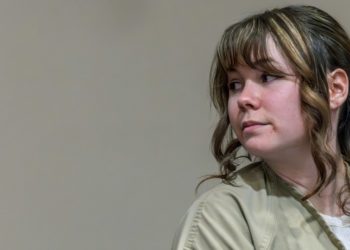My husband is sleeping peacefully beside me. Down the hall, the children doze, too — no stomachaches or nightmares tonight. But I cannot sleep. I’m staring at the ceiling, head full of screeching zombies and blown-out cities.
“The Last of Us,” the HBO series about a fungus that turns people into zombies, based on a video game, returned for its second season last month. I have been unwell since. Each episode has left me sleeping badly and haunted while awake, dreading the next Sunday, when I’ll have to sit down in front of my TV and do it all again. I spent the 57 unbearable minutes of Season 2, Episode 2, gripping, alternately, my husband and the giant cushion that more typically forms the back of our couch, occasionally screaming variations on “Dear God,” “No” and “Ugh.”
I know that in the two years since I survived Season 1, there must have been many months when I lived a normal life, not contemplating zombies at all, much less the apocalyptic potential of mushrooms. And yet now that the show is back, I cannot fathom how exactly that worked. If you see me this spring — cheering enthusiastically at my son’s baseball game, making small talk at the potluck barbecue — know that inside, I am barely holding it together.
“Why don’t you just stop watching?” you ask. So do my friends, my family, the waitress who had the unfortunate responsibility of explaining a mushroom dish to me recently. It’s a great question and one I’ve asked myself daily since mid-April. Why am I, a 40-year-old woman whose other hobbies include analyzing Taylor Swift lyrics and shopping for athleisure, so obsessed with a show that is clearly torturing me?
I’ve come to the unfortunate realization that the torture might be the point. There’s no better distraction from whatever currently ails you than, well, something worse. I could use some distraction these days.
When I’m thinking about the zombie apocalypse, I am not thinking about the kind-of-sort-of-possibly apocalyptic things that are really taking place in 2025. My brain just can’t do both things at once. So while I salute all of you out there doing the hard work to make change in our actual world, I guess I choose the zombies.
We watch them — or some other terrible, fictional creature — on the screen, and we’re swallowed whole into another world. We’re forced to come right up to the edge of the thing that scares us. We remind ourselves that it isn’t real, but we think, too: What if it were? Could we face it? And how? Often, we come around to a place where we believe we could.
I was first exposed to this approach years ago, when I had a miscarriage. It was the first truly bad thing that ever happened to me, and I was feeling shattered, bereft. Some people return to reruns of “The Office” in such a moment or the romantic comedies of their youth. My therapist recommended horror movies.
Horror movies? I did not like blood and guts. I did not like moments of suspense. I did not like “The Blair Witch Project” when I saw it in 1999. My therapist swore the grisly shock of the genre helped jolt many of her patients out of their circumstances, out of their grief, at least for an hour or two.
I couldn’t bring myself to do it until I landed in the hospital with another pregnancy gone sideways. My husband and I put “Get Out” on my laptop, propping the computer on the hospital bed. I remember feeling, strangely, a little lighter as we watched, freed from my questions and worries and heartbreak, intently focused on someone else’s very, very bad day. (Having your girlfriend’s family try to swap your brain — it could always be worse.)
I wish I could get this specific brand of perspective by watching “When Harry Met Sally.” Gamers, preppers and general fans of gore handle such content just fine, but I remain weak. With “The Last of Us,” I’m out of my depth; I lack a proper support system. I recently tried to steer the conversation in my 16-person “Neighborhood Mommas” group chat toward the zombie show. The response was mostly crickets, save one friend who asked if “The Last of Us” was the one Blake Lively filed a lawsuit over. (That’s the movie “It Ends With Us,” based on a romance novel. Very different vibes.)
My husband hasn’t been much help, either. He’s watched the show unperturbed while eating snacks. After years of fishing for compliments, I began fishing for comfort.
“A fungal zombie pandemic couldn’t actually happen, right?” I asked him, a biology major in college, before bed one night.
“In theory,” he said matter-of-factly, turning out the light.
I settled in for another night of staring at the ceiling.
The season ends Sunday night, thank God. I feel relief, as if I had been spared by a giant mushroom zombie. All I have to do is get through this episode, and then I can move on with my life.
But I’ll admit there’s a tinge of sadness, too. The real world will surely continue being relentless. The news will have me desperate for a reprieve. What terrifying alternate reality will I escape to now?
The only thing worse than suffering through a fantasy apocalypse is having to find a new one.
Rachel Feintzeig is a journalist at work on a book about staring down 40.
The Times is committed to publishing a diversity of letters to the editor. We’d like to hear what you think about this or any of our articles. Here are some tips. And here’s our email: [email protected].
Follow the New York Times Opinion section on Facebook, Instagram, TikTok, Bluesky, WhatsApp and Threads.
The post What I Like About Zombies appeared first on New York Times.




